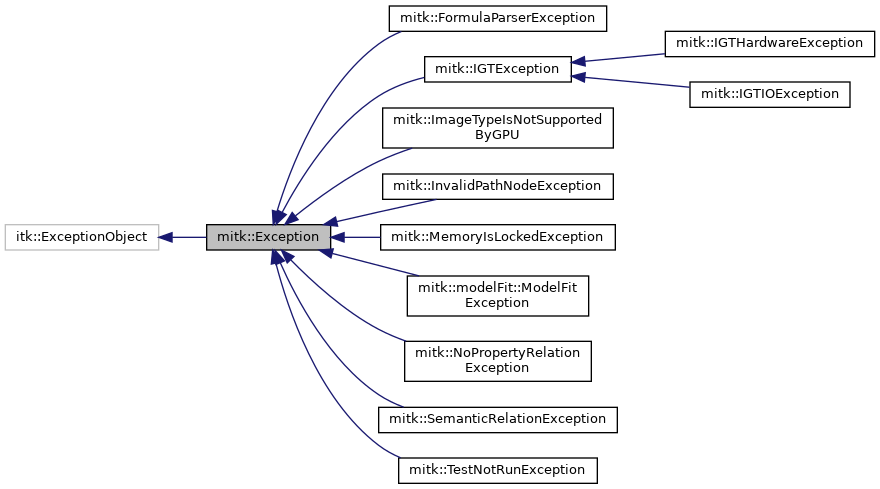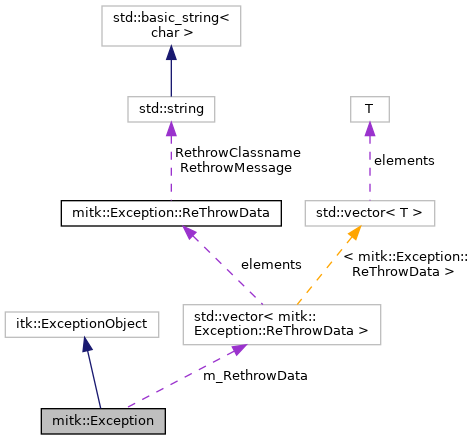An object of this class represents an exception of MITK. Please don't instantiate exceptions manually, but use the exception macros (file mitkExceptionMacro.h) instead. Simple use in your code is: More...
#include <mitkException.h>


Classes | |
| struct | ReThrowData |
Public Member Functions | |
| Exception (const char *file, unsigned int lineNumber=0, const char *desc="None", const char *loc="Unknown") | |
| ~Exception () override throw () | |
| virtual const char * | GetClassName () const |
| void | AddRethrowData (const char *file, unsigned int lineNumber, const char *message) |
| Adds rethrow data to this exception. More... | |
| int | GetNumberOfRethrows () |
| void | GetRethrowData (int rethrowNumber, std::string &file, int &line, std::string &message) |
| template<class T > | |
| Exception & | operator<< (const T &data) |
| Definition of the bit shift operator for this class. More... | |
| template<class T > | |
| Exception & | operator<< (T &data) |
| Definition of the bit shift operator for this class (for non const data). More... | |
| Exception & | operator<< (std::ostream &(*func)(std::ostream &)) |
| Definition of the bit shift operator for this class (for functions). More... | |
Protected Attributes | |
| std::vector< ReThrowData > | m_RethrowData |
Detailed Description
An object of this class represents an exception of MITK. Please don't instantiate exceptions manually, but use the exception macros (file mitkExceptionMacro.h) instead. Simple use in your code is:
Documentation
mitkThrow() << "optional exception message";
You can also define specialized exceptions which must inherit from this class. Please always use the mitkExceptionClassMacro when implementing specialized exceptions. A simple implementation can look like:
class MyException : public mitk::Exception { public: mitkExceptionClassMacro(MyException,mitk::Exception); };
You can then throw your specialized exceptions by using the macro
mitkThrowException(MyException) << "optional exception message";
Definition at line 45 of file mitkException.h.
Constructor & Destructor Documentation
◆ Exception()
|
inline |
Definition at line 48 of file mitkException.h.
◆ ~Exception()
|
inlineoverride | |||||||||||||
Definition at line 53 of file mitkException.h.
Member Function Documentation
◆ AddRethrowData()
| void mitk::Exception::AddRethrowData | ( | const char * | file, |
| unsigned int | lineNumber, | ||
| const char * | message | ||
| ) |
Adds rethrow data to this exception.
◆ GetClassName()
|
virtual |
Reimplemented in mitk::NoPropertyRelationException, mitk::InvalidPathNodeException, and mitk::MemoryIsLockedException.
◆ GetNumberOfRethrows()
| int mitk::Exception::GetNumberOfRethrows | ( | ) |
- Returns
- Returns how often the exception was rethrown.
◆ GetRethrowData()
| void mitk::Exception::GetRethrowData | ( | int | rethrowNumber, |
| std::string & | file, | ||
| int & | line, | ||
| std::string & | message | ||
| ) |
- Returns
- Returns the rethrow data of the specified rethrow number. Returns empty data, if the rethrowNumber doesn't exist.
- Parameters
-
rethrowNumber The internal number of the rethrow. file (returnvalue) This variable will be filled with the file of the specified rethrow. line (returnvalue) This variable will be filled with the line of the specified rethrow. message (returnvalue) This variable will be filled with the message of the specified rethrow.
◆ operator<<() [1/3]
|
inline |
Definition of the bit shift operator for this class.
Definition at line 74 of file mitkException.h.
◆ operator<<() [2/3]
|
inline |
Definition of the bit shift operator for this class (for functions).
Definition at line 93 of file mitkException.h.
◆ operator<<() [3/3]
|
inline |
Definition of the bit shift operator for this class (for non const data).
Definition at line 84 of file mitkException.h.
Member Data Documentation
◆ m_RethrowData
|
protected |
Definition at line 109 of file mitkException.h.
The documentation for this class was generated from the following file:
